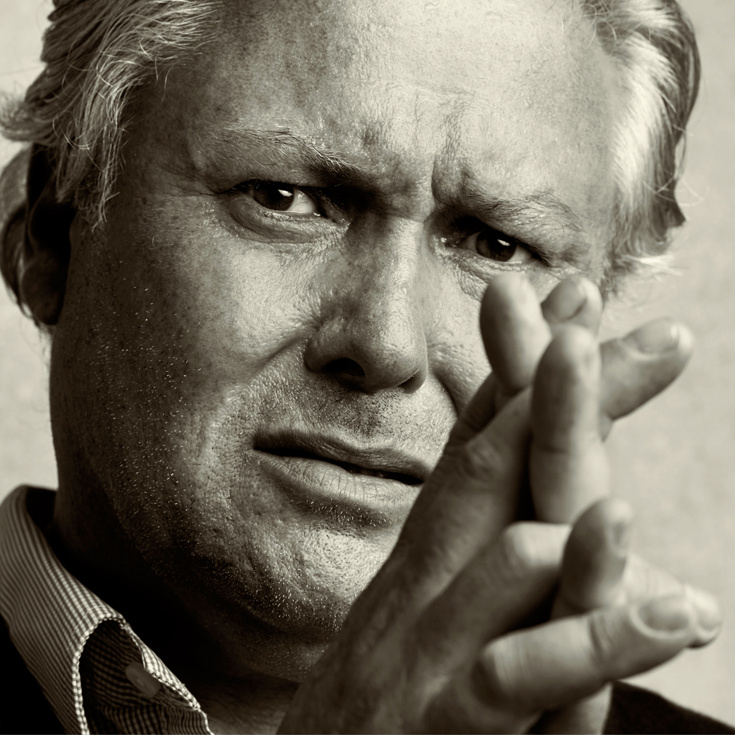Game of Thrones Star Conleth Hill on His Leap to London’s Who's Afraid of Virginia Woolf?

Conleth Hill may be best known as the manipulative eunuch Lord Varys on the international TV hit Game of Thrones, but the gifted Northern Irish actor has two Olivier Awards and a 2001 Tony nomination (for the two-hander Stones in His Pockets) to his name—not to mention additional stage credits that include playing Macbeth opposite Frances McDormand at California’s Berkeley Rep last year. Hill is back on the West End for the first time in four years as George opposite Imelda Staunton’s Martha in Edward Albee’s modern classic Who's Afraid of Virginia Woolf?, now previewing at the Harold Pinter Theatre. Broadway.com caught up with the reflective, articulate Hill during a break in rehearsals to talk about playing half of an iconic, warring theatrical couple and why he can’t reveal much about what awaits in Westeros.
George is one of the most famous roles in the American theatrical repertoire. Have you had much exposure to these plays?
I did Willie Oban in O’Neill’s The Iceman Cometh at the Lyric Theatre, Belfast, back in 1989, and I’m a great fan of American literature: Williams and Albee and many others, as well. I don’t know that I would have thought of George necessarily as a part for me, but I’m not very good at circling things. I assume it was Imelda who suggested me.
What do you think of the comment Mr. Albee once made to me that George’s function in the play is “to come under Martha”?
That’s a great observation, and I think that’s what we’re finding. George seems to just dissipate whatever kind of crazy energy Martha has by undercutting it. The thing about George, too, is that he’s a survivor. There is so much he does put up with, but the crux of this particular evening is that he can’t put up with her betrayal of a certain subject that you’ll know if you know the play; she just has to stop.
Doesn’t it seem as if the stakes are especially high for George and Martha on this particular night, when they host the younger couple, Nick and Honey (played by Luke Treadaway and Imogen Poots)?
There is something different about this night, definitely. I think George and Martha enjoy playing their games, but suddenly he’s not playing in the way that he ordinarily does. He stands up to her maybe more than he would have done before—not necessarily physically, but certainly intellectually.
Is it challenging knowing how many notable Georges have come before, including Richard Burton in the 1966 film and recent Tony winners Bill Irwin and Tracy Letts?
That hasn’t come up. Our approach to the text has been “just do it.” There has never been a term of reference to some other person who played it before, ever. If you were worried about predecessors, you would never leave the house. If people are going to make comparisons, there’s nothing you can do about it, so you might as well get on with it.
Did you revisit the movie?
I’ve actually never seen it, though I had met [director] Mike Nichols in New York. I just wasn't tempted to watch it, especially now. The movie had the most powerful showbiz couple at the time [Burton and Elizabeth Taylor] playing the roles, and that’s not what we’re doing. Our task is to start at the beginning [of the text] and just go through it. It’s been hard work and pretty relentless, but I have to say I’ve been loving it.
Did you have anything to do with Mr. Albee before he died this past September at age 88?
The story was that he could say yay or nay to our casting, so he did approve us. He died a couple of days after we’d been told we had the roles.
What’s it been like working with Imelda Staunton, who is returning to the stage for the first time since Gypsy?
Just fantastic—it’s both an education and a pleasure. Imelda and I had worked together on a play for the BBC called That Day We Sang and thought, “We must look for a play we could do together.” Some while later I got the call asking whether I would play George opposite Imelda’s Martha.
Is it more difficult to return to the theater given your fame as a result of Game of Thrones?
It is harder because it’s more time-consuming and it’s usually away from home [in Northern Ireland]. So, yeah, definitely it gets harder the older you get. But I’m still enjoying it; I wouldn’t do it if I didn’t.
Speaking of Game of Thrones, did you anticipate the show’s worldwide success?
No, not at all. I wasn’t really sure what would happen. But what quickly became clear is that the production quality is second to none and all the departments work so brilliantly together. Very rarely do we get a rewrite or a change.
Can you tell us anything about what the series has in store?
We’ve got one more series left to shoot, and the second-to-last series hasn’t gone out yet, so I can't really say anything—and I don't want to spoil anything either. What I can say is that it has been one of the most fantastic experiences of my life, the whole thing, and the fact that it is made where I live makes me so proud. As long as the show is around, I am going to be there.